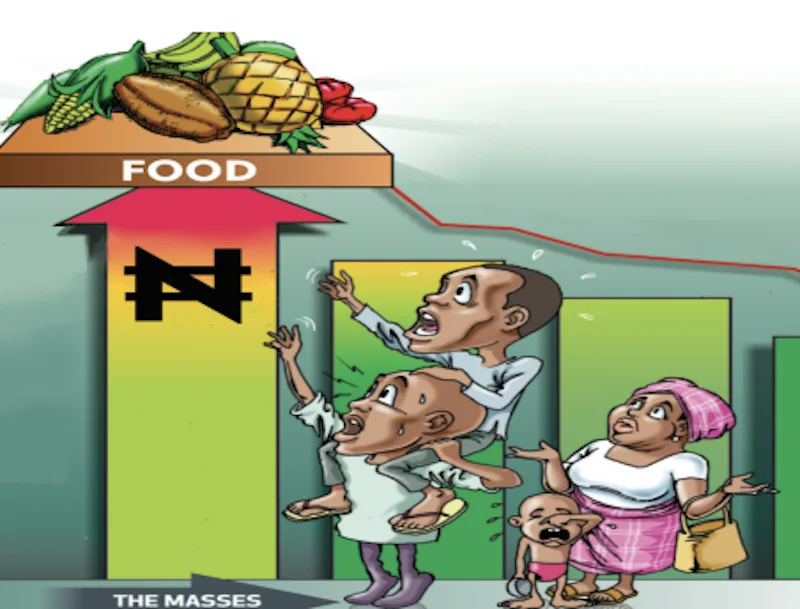A Crisis on Every Plate
In the bustling streets of Lagos, markets are abuzz with activities, yet the tension is palpable. Food prices have skyrocketed, leaving many struggling to afford basic necessities.
The National Bureau of Statistics (NBS) paints a grim picture: food inflation in Nigeria has outpaced general inflation, reaching an unprecedented 39.16% in October 2024.
Join our WhatsApp ChannelStaples such as beans, rice, eggs, and bread have become symbols of hardship, their prices surging by triple-digit percentages within a year.
For residents of Lagos, the cost of survival is more than financial—it’s psychological and emotional. “It feels like every time I go to the market, I leave with less and pay more,” said Nkechi Dennison, a mother of two from Surulere who came shopping at Oshodi market. “How do I explain to my children that we can no longer afford eggs or even bread for breakfast?”
The Numbers That Tell a Story
The statistics are worrisome. Beans, once considered an affordable source of protein, saw a 254.23% increase, rising from N790 per kilogram in October 2023 to N2,798 in October 2024. Eggs, a staple in most households, jumped by 140.21% within the same period. Bread prices followed suit, climbing by 103.76%, while local rice rose by 137.32%.
This escalation has pushed many into deeper poverty. According to the World Bank, 87 million Nigerians lived below the poverty line in 2023, a figure likely worsened by the current economic conditions. The hunger crisis, exacerbated by rising food prices, has left 31.5 million Nigerians at risk of acute hunger this year, according to UNICEF.
Voices from the street of Lagos
In Isolo, Baba Segun, a carpenter, shared his frustration: “I used to spend N5,000 weekly to feed my family of four. Now, even N15,000 isn’t enough. What’s the point of working if I can’t feed my family?”
From the crowded markets of Mushin, Fatima Ibrahim, a trader, explained how the price hikes have affected her business. “Customers come, complain about prices, and walk away. I can’t sell what I can’t afford myself. We’re all suffering.”
READ ALSO: Inflation Crisis: Nigerians Lament As Food Prices Surge Deepens Ahead Of Festive Period
Chinedu, a taxi driver in Oshodi, pointed to the broader impact of food inflation. “When food prices go up, everything else follows. Transport costs, rent—it’s like a chain reaction. But our incomes remain the same, or worse, they shrink.”
Even in the upscale areas of Victoria Island, the pinch is being felt. Sandra, a tech professional during a visit to the mainland, noted, “I earn well, but the cost of living is eroding my savings. It’s not just about food; it’s the overall cost of survival especially for us on the Island. ”
Expert Perspectives on Food Inflation
Economic analysts have identified multiple factors driving the crisis. Dr. Ahmed Bello, an economist at the University of Lagos, highlighted insecurity as a key issue. “Farmers are unable to access their lands due to banditry and herdsmen attacks. This disrupts the supply chain and drives up food prices.”
Agricultural expert, Mrs. Folake Olaniyan, emphasised inefficiencies in Nigeria’s agricultural sector. “We produce a lot, but we waste even more due to poor storage and transportation infrastructure. Without addressing these systemic issues, food prices will remain high,” she said.
Government Efforts and Public Outcry
The Federal Government’s interventions, such as releasing 42,000 metric tonnes of grains and setting up subsidised food hubs, offer temporary relief but fail to address the root causes. “These are band-aid solutions,” Dr. Bello argued. “We need long-term policies that focus on security, infrastructure, and reducing dependence on imports.”
Lagos State has implemented Sunday markets offering subsidised food items, but Fatima from Mushin dismissed these as inadequate. “How can one day of cheaper food solve a problem that affects us every day?” she asked.
What Lies Ahead?
The rising food prices in Lagos and across Nigeria is more than an economic issue—it is a human crisis. Without urgent and sustained action from the government, the situation will only worsen. Sandra’s words from Victoria Island echo a collective plea: “We need solutions, not just promises. Food is life, and right now, life is getting harder for everyone.”
As Lagosians navigate this daunting reality, the hope for change lingers. Whether through better policies, improved security, or innovative agricultural practices, the call for action grows louder with every empty plate.
Emmanuel Ochayi is a journalist. He is a graduate of the University of Lagos, School of first choice and the nations pride. Emmanuel is keen on exploring writing angles in different areas, including Business, climate change, politics, Education, and others.
- Emmanuel Ochayihttps://www.primebusiness.africa/author/ochayi/
- Emmanuel Ochayihttps://www.primebusiness.africa/author/ochayi/
- Emmanuel Ochayihttps://www.primebusiness.africa/author/ochayi/
- Emmanuel Ochayihttps://www.primebusiness.africa/author/ochayi/



















Follow Us